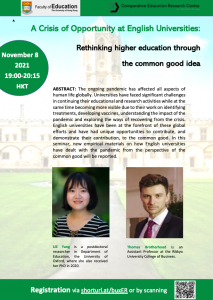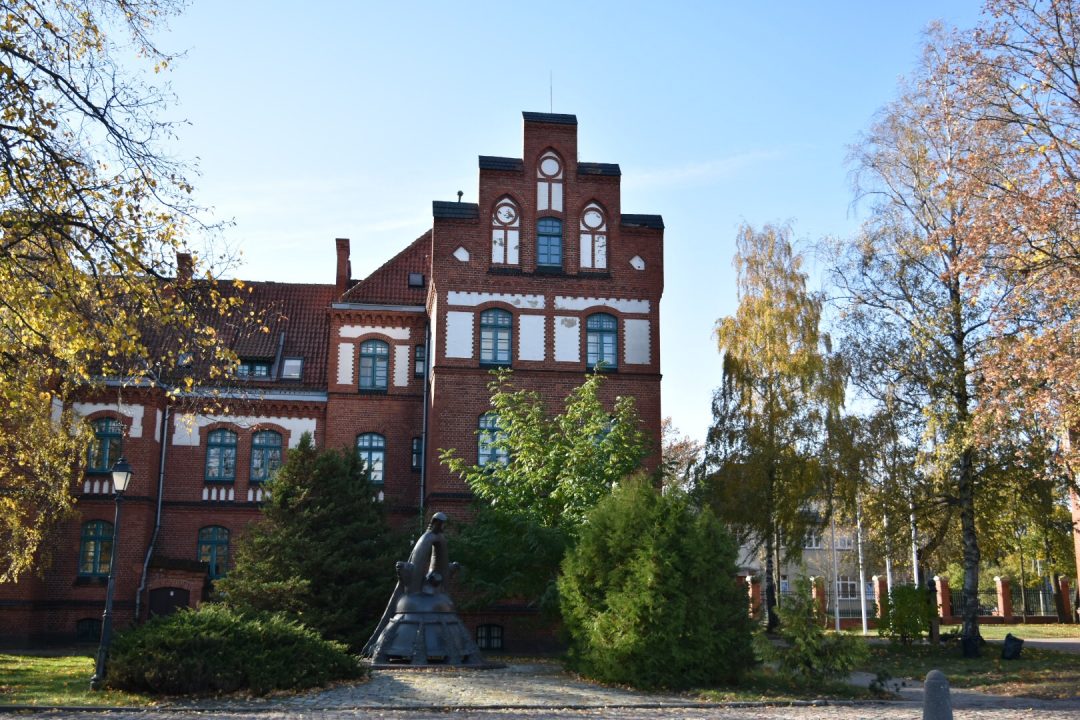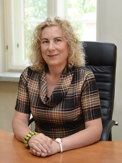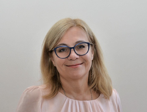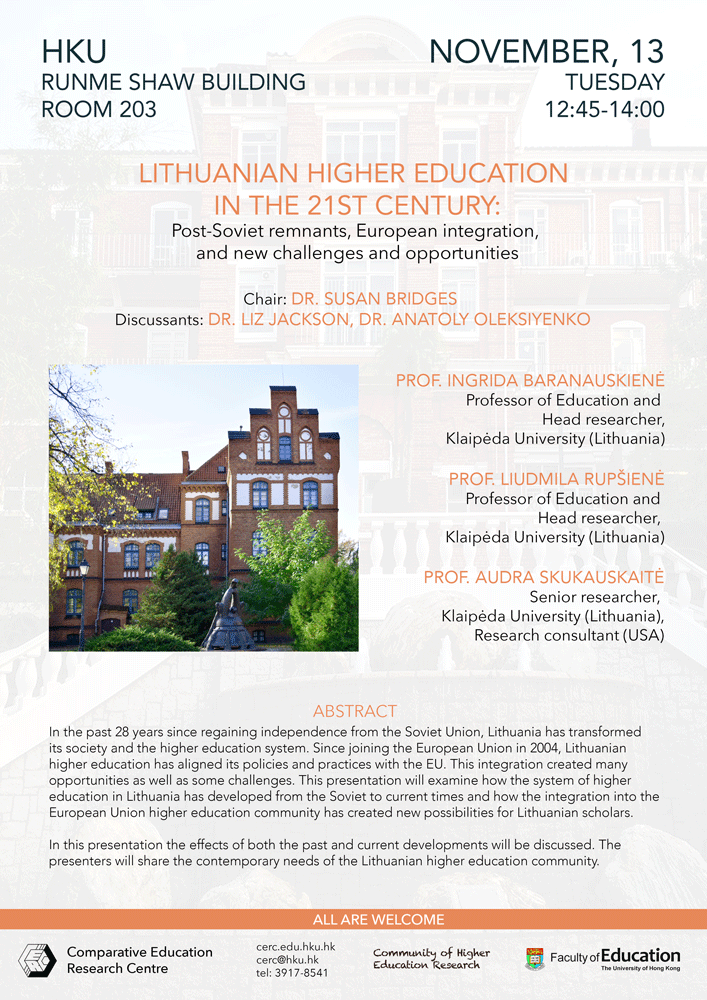Global Higher Education Bulletin (Hong Kong)
Vol. 4, No. 1, December 22, 2020
Editor: Anatoly Oleksiyenko
Greetings!
As 2020 comes to a close, it is good to look beyond the challenges it brought and marvel in the blessings that we share. Supporting each other, being there for one another, and just making the best of extremely trying circumstances – that is what made this year special. As Christmas approaches, I wish peace, love and joy all of you who celebrate. May 2021 bring all of us hope for a better future, as we navigate it together.
For our current students, digital learning will most likely continue in the second semester. The twenty-five students who joined our program last September have been living through a very unique experience in the history of M.Ed. (Higher Education), with the majority of their postgraduate studies taking place in cyberspace. I appreciate the effort that went into adapting to the changes in your learning environment, managing changes in your own personal lives, and still continuing to be exceptional in your academic performance. Thank you for your enthusiasm, diligence, resilience, and support of one another. As the Higher Education program enters its tenth anniversary year, it is clear that our next student cohorts will need to be online more than their predecessors, but – we hope – not as much as the 2020-21 cohort. As we wait for vaccines to defeat the COVID-19 pandemic, we are hopeful that this year’s cohort will have more opportunities to meet and learn with each other in person. Face-to-face exchange will be prioritized over virtual experiences to the greatest extent possible, while still focusing on keeping everyone healthy and safe.
Our program has made a new call for admissions recently, and we encourage you to share this news widely, encouraging prospective candidates to become part of our global network. Currently, we have more than 200 graduates across the globe, and many have been making significant progress professionally as university and college administrators, faculty members, researchers, teachers, consultants, etc. Hearing about their accomplishments and aspirations is always rewarding, and motivates all of us – both faculty and students – to work harder and be the best that we can be.
As the festive time approaches and you may have some time to rummage around the academic collections in the field, we encourage you to read from our most recent research portfolio, and certainly use the opportunity to reconnect with your teachers and mentors. Here is a list of last year’s publications from the teachers and peers in our network:
Aiston, S. J., & Fo, C. K. (2020). The silence/ing of academic women. Gender and Education, 1-18 https://www.tandfonline.com/doi/abs/10.1080/09540253.2020.1716955
Aiston, S. J., Fo, C. K., & Law, W. W. (2020). Interrogating strategies and policies to advance women in academic leadership: the case of Hong Kong. Journal of Higher Education Policy and Management, 42(3), 347-364 https://www.tandfonline.com/doi/abs/10.1080/1360080X.2020.1753393
Jandrić, P., Hayes, D., Truelove, I., Levinson, P., Mayo, P., Ryberg, T., Bridges, S…. & Jackson, L. (2020). Teaching in the Age of Covid-19. Postdigital Science and Education, 1-162 https://link.springer.com/article/10.1007/s42438-020-00169-6
Bridges, S. M., Hmelo-Silver, C. E., Chan, L. K., Green, J. L., & Saleh, A. (2020). Dialogic intervisualizing in multimodal inquiry. International Journal of Computer-Supported Collaborative Learning, 1-36 https://link.springer.com/article/10.1007/s11412-020-09328-0
Bridges, S. M., Chan, L. K., Chen, J. Y., Tsang, J. P., & Ganotice, F. A. (2020). Learning environments for interprofessional education: A micro-ethnography of sociomaterial assemblages in team-based learning. Nurse Education Today, 94, 104569 https://www.sciencedirect.com/science/article/abs/pii/S0260691720314192
Carless, D. (2020). From teacher transmission of information to student feedback literacy: Activating the learner role in feedback processes. Active Learning in Higher Education, https://journals.sagepub.com/doi/abs/10.1177/1469787420945845
Carless, D. (2020). Double duty, shared responsibilities and feedback literacy. Perspectives on Medical Education, 9(4), 199-200 https://link.springer.com/article/10.1007/s40037-020-00599-9
Carless, D., & Winstone, N. (2020). Teacher feedback literacy and its interplay with student feedback literacy. Teaching in Higher Education, 1-14 https://srhe.tandfonline.com/doi/abs/10.1080/13562517.2020.1782372#.X3JNiNNKiu4
Dawson, P., Carless, D., & Lee, P. P. W. (2020). Authentic feedback: supporting learners to engage in disciplinary feedback practices. Assessment & Evaluation in Higher Education, 1-11 https://www.tandfonline.com/doi/abs/10.1080/02602938.2020.1769022
Malecka, B., Boud, D., & Carless, D. (2020). Eliciting, processing and enacting feedback: mechanisms for embedding student feedback literacy within the curriculum. Teaching in Higher Education, 1-15 https://doi.org/10.1080/13562517.2020.1754784
Smyth, P., & Carless, D. (2020). Theorising how teachers manage the use of exemplars: towards mediated learning from exemplars. Assessment & Evaluation in Higher Education, 1-14 https://doi.org/10.1080/02602938.2020.1781785
Winstone, N. E., Balloo, K., & Carless, D. (2020). Discipline-specific feedback literacies: A framework for curriculum design. Higher Education, 1-21 https://link.springer.com/article/10.1007/s10734-020-00632-0
Chan, R. Y. (2020). Studying Coronavirus (COVID-19) and Global Higher Education: Evidence for Future Research and Practice. SSRN http://dx.doi.org/10.2139/ssrn.3622751
Deneen, C. C., & Prosser, M. (2020). Freedom to innovate. Educational Philosophy and Theory, 1-9. https://www.tandfonline.com/doi/abs/10.1080/00131857.2020.1783244
Horta, H., & Shen, W. (2020). Current and future challenges of the Chinese research system. Journal of Higher Education Policy and Management, 42(2), 157-177 https://www.tandfonline.com/doi/abs/10.1080/1360080X.2019.1632162
Horta, H. (2020). PhD Students’ Self-Perception of Skills Acquired During Their PhD and Plans for Their Postdoctoral Careers: A Joint Analysis of Doctoral Students at Three Flagship Universities in Asia. In Structural and Institutional Transformations in Doctoral Education (pp. 275-323). Palgrave Macmillan, Cham https://link.springer.com/chapter/10.1007/978-3-030-38046-5_10
Horta, H., & Santos, J. M. (2020). The Multidimensional Research Agendas Inventory—Revised (MDRAI-R): Factors shaping researchers’ research agendas in all fields of knowledge. Quantitative Science Studies, 1(1), 60-93 https://doi.org/10.1162/qss_a_00017
Jiang, Q., Yuen, M., & Horta, H. (2020). Factors Influencing Life Satisfaction of International Students in Mainland China. International Journal for the Advancement of Counselling, 42(4), 393-413 https://link.springer.com/article/10.1007/s10447-020-09409-7
Santos, J. M., & Horta, H. (2020). The association between researchers’ conceptions of research and their strategic research agendas. Journal of Data and Information Science, 5(4), 56-74 https://doi.org/10.2478/jdis-2020-0032
Santos, J. M., Horta, H., & Amâncio, L. (2020). Research agendas of female and male academics: a new perspective on gender disparities in academia. Gender and Education, 1-19 https://doi.org/10.1080/09540253.2020.1792844
Jackson, L. (2020). Academic freedom of students. Educational Philosophy and Theory, 1-8 https://www.tandfonline.com/doi/abs/10.1080/00131857.2020.1773798
Jackson, L., Alston, K., Bialystok, L., Blum, L., Burbules, N. C., Chinnery, A., … & Stitzlein, S. M. (2020). Philosophy of education in a new key: Snapshot 2020 from the United States and Canada. Educational Philosophy and Theory, 1-17. https://doi.org/10.1080/00131857.2020.1821189
Gibbons, A., Tesar, M., Arndt, S., Kupferman, D. W., Badenhorst, D., Jackson, L., … & Peters, M. A. (2020). The highway Robber’s road to knowledge socialism: A collective work on collective work. In Knowledge Socialism (pp. 301-325). Springer, Singapore. https://link.springer.com/chapter/10.1007/978-981-13-8126-3_15
Peters, M. A., Wang, H., Ogunniran, M. O., Huang, Y., Green, B., Chunga, J. O., ..Jackson, L… & Khomera, S. W. (2020). China’s internationalized higher education during Covid-19: collective student autoethnography. Postdigital Science and Education, 1. https://link.springer.com/article/10.1007/s42438-020-00128-1
Peters, M. A., Arndt, S., Tesar, M., Jackson, L., Hung, R., Mika, C., … & Madjar, A. (2020). Philosophy of education in a new key: A collective project of the PESA executive. Educational Philosophy and Theory, 1-22 https://doi.org/10.1080/00131857.2020.1759194
Peters, M. A., Brighouse, S., Tesar, M., Sturm, S., & Jackson, L. (2020). The open peer review experiment in Educational Philosophy and Theory (EPAT). Educational Philosophy and Theory, https://doi.org/10.1080/00131857.2020.1846519
Peters, M., Oladele, O. M., Green, B., Samilo, A., Lv, H., Amina, L., ..Jackson, L… & Ianina, T. (2020). Education in and for the Belt and Road Initiative: The Pedagogy of Collective Writing. Educational Philosophy and Theory, 1-24 https://doi.org/10.1080/00131857.2020.1718828
Reader, J., Jandrić, P., Peters, M. A., Barnett, R., Garbowski, M., Lipińska, V., ..Jackson, L.,. & Bevan, A. (2020). Enchantment-Disenchantment-Re-Enchantment: Postdigital Relationships between Science, Philosophy, and Religion. Postdigital Science and Education, 1-32 https://link.springer.com/article/10.1007/s42438-020-00133-4
Jung, J. (2020). The fourth industrial revolution, knowledge production and higher education in South Korea. Journal of Higher Education Policy and Management, 42(2), 134-156 https://doi.org/10.1080/1360080X.2019.1660047
Jung, J. (2020). Master’s education in Hong Kong: Access and programme diversity. Higher Education Policy, 1-23 https://link.springer.com/article/10.1057/s41307-020-00202-0
Jung, J. (2020). Master’s Education in Massified, Internationalized, and Marketized East Asian Higher Education Systems. Higher Education Policy, 1-6. https://link.springer.com/article/10.1057/s41307-020-00215-9
Jung, J., & Li, X. Exploring motivations of a master’s degree pursuit in Hong Kong. Higher Education Quarterly https://onlinelibrary.wiley.com/doi/abs/10.1111/hequ.12276
Lee, S. J., Kim, S., & Jung, J. (2020). The Effects of a Master’s Degree on Wage and Job Satisfaction in Massified Higher Education: The Case of South Korea. Higher Education Policy, 1-29 https://link.springer.com/article/10.1057/s41307-020-00200-2
Manathunga, C., Grant, B., Kelly, F., Raddon, A., & Jung, J. (2020). (Re) Birthing the Academy: Unruly Daughters Striving for Feminist Futures. In (Re) birthing the Feminine in Academe (pp. 249-268). Palgrave Macmillan, Cham https://link.springer.com/chapter/10.1007/978-3-030-38211-7_10
Lanford, M. (2020). Institutional competition through performance funding: A catalyst or hindrance to teaching and learning?. Educational Philosophy and Theory, 1-13 https://www.tandfonline.com/doi/abs/10.1080/00131857.2020.1783246
Lanford, M. (2020, June). In Pursuit of Respect: The Adult Learner Attending Community College in the “New Economy”. In The Educational Forum (pp. 1-15). Routledge.
https://www.tandfonline.com/doi/full/10.1080/00131725.2020.1775329
Lanford, M. (2020). What Can Relational Sociology Reveal about College Writing and Remediation?. In William G. Tierney and S. Kolluri (eds.). Relational Sociology and Research on Schools, Colleges, and Universities. SUNY Press. http://www.sunypress.edu/p-6854-relational-sociology-and-resear.aspx
Lo, W. Y. W. (2020). A year of change for Hong Kong: from east-meets-west to east-clashes-with-west. Higher Education Research & Development, 1-5 https://www.tandfonline.com/doi/full/10.1080/07294360.2020.1824210
Lee, J. T., Lo, W. Y. W., & Abdrasheva, D. (2020). Institutional logic meets global imagining: Kazakhstan’s engagement with China’s Belt and Road Initiative. Higher Education, 1-17 https://link.springer.com/article/10.1007/s10734-020-00634-y
Mulvey, B., & Lo, W. Y. W. (2020). Learning to ‘tell China’s story well’: the constructions of international students in Chinese higher education policy. Globalisation, Societies and Education, 1-13 https://doi.org/10.1080/14767724.2020.1835465
Ma, J., Zhu, K., Cao, Y., Chen, Q., & Cheng, X. (2020). An empirical study on the correlation between university discipline and industrial structure in the Guangdong, Hong Kong, and Macao greater bay area. Asian Education and Development Studies. https://doi.org/10.1108/AEDS-09-2019-0155
Ma, J., Jiang, F., Gu, L., Zheng, X., Lin, X., & Wang, C. (2020). Patterns of the Network of Cross-Border University Research Collaboration in the Guangdong-Hong Kong-Macau Greater Bay Area. Sustainability, 12(17), 6846. https://doi.org/10.3390/su12176846
Macfarlane, B. (2020). Myths about students in higher education: separating fact from folklore. Oxford Review of Education, 1-15 https://www.tandfonline.com/doi/abs/10.1080/03054985.2020.1724086
Macfarlane, B. (2020). The CV as a symbol of the changing nature of academic life: performativity, prestige and self-presentation. Studies in Higher Education, 45(4), 796-807. https://doi.org/10.1080/03075079.2018.1554638
Macfarlane, B., & Erikson, M. G. (2020). The right to teach at university: a Humboldtian perspective. Educational Philosophy and Theory, 1-12 https://www.tandfonline.com/doi/abs/10.1080/00131857.2020.1783245
Oleksiyenko, A. (2020). Is academic freedom feasible in the post-Soviet space of higher education?. Educational Philosophy and Theory, 1-11 https://www.tandfonline.com/doi/abs/10.1080/00131857.2020.1773799
Oleksiyenko, A., & Jackson, L. (2020). Freedom of speech, freedom to teach, freedom to learn: The crisis of higher education in the post-truth era. Educational Philosophy and Theory, 1-6 https://www.tandfonline.com/doi/abs/10.1080/00131857.2020.1773800
Oleksiyenko, A., Blanco, G., Hayhoe, R., Jackson, L., Lee, J., Metcalfe, A., Subramanian, M. & Zha, Q. (2020). Comparative and international higher education in a new key? Thoughts on the post-pandemic prospects of scholarship. Compare: A Journal of Comparative and International Education, 1-17 https://doi.org/10.1080/03057925.2020.1838121
Oleksiyenko, A., Terepyshchyi, S., Gomilko, O., & Svyrydenko, D. (2020). ‘What Do You Mean, You Are a Refugee in Your Own Country?’: Displaced Scholars and Identities in Embattled Ukraine. European Journal of Higher Education, 1-18 https://www.tandfonline.com/doi/abs/10.1080/21568235.2020.1777446
Postiglione, G. A. (2020). Expanding Higher Education: China’s Precarious Balance. The China Quarterly, 1-22. https://doi.org/10.1017/S0305741020000995
Holliday, I. & Postiglione, G.A. (2020). Hong Kong Higher Education and the 2020 Outbreak: We’ve Been Here Before. International Higher Education, 102:20-22. https://www.internationalhighereducation.net/api-v1/article/!/action/getPdfOfArticle/articleID/2911/productID/29/filename/article-id-2911.pdf
Altbach, P.G. and Postiglione, G.A. (2020, July 25). Will new security law prove a turning point for HE? University World News, https://www.universityworldnews.com/post.php?story=20200724110105165
Xie, A., Postiglione, G. A., & Huang, Q. (2020). The Greater Bay Area (GBA) Development Strategy and Its Relevance to Higher Education. ECNU Review of Education, 2096531120964466. https://doi.org/10.1177/2096531120964466
Trigwell, K., & Prosser, M. (2020). Exploring University Teaching and Learning. Palgrave Pivot, Cham. https://link.springer.com/book/10.1007/978-3-030-50830-2
Ruan, N. (2020). Accumulating academic freedom for intellectual leadership: Women professors’ experiences in Hong Kong. Educational Philosophy and Theory, 1-11 https://www.tandfonline.com/doi/abs/10.1080/00131857.2020.1773797
Ruan, N. (2020). Interviewing elite women professors: Methodological reflections with feminist research ethics. Qualitative Research, https://doi.org/10.1177/1468794120965368
Shchepetylnykova, I., & Alvis, S. (2020). Contribution of International Development Activities to Comprehensive Internationalization of US Public Universities. Journal of Comparative and International Higher Education, 12(1), 15-26. https://doi.org/10.32674/jcihe.v12iSpring.1425
Tang, H. H. H. (2020). The strategic role of world-class universities in regional innovation system: China’s Greater Bay Area and Hong Kong’s academic profession. Asian Education and Development Studies https://www.emerald.com/insight/content/doi/10.1108/AEDS-10-2019-0163/full/html
Tang, H. H. H. (2020). Global Trend and Institutional Practices of Knowledge Exchange Activities in Universities: The Changing Academic Profession in Hong Kong. In Re-envisioning Higher Education’s Public Mission (pp. 251-273). Palgrave Macmillan, Cham. https://link.springer.com/chapter/10.1007/978-3-030-55716-4_13
Tang, H. H. H., & Chau, C. F. W. (2020). Knowledge exchange in a global city: a typology of universities and institutional analysis. European Journal of Higher Education, 10(1), 93-112 https://www.tandfonline.com/doi/abs/10.1080/21568235.2019.1694424
Chan, W. W. V., Tang, H. H. H., & Cheung, R. L. K. (2020). Freedom to Excel: Performativity, Accountability, and Educational Sovereignty in Hong Kong’s Academic Capitalism. In Academic Freedom Under Siege (pp. 125-145). Springer, Cham. https://link.springer.com/chapter/10.1007/978-3-030-49119-2_6
Tierney, W. G. (2020). Get Real: 49 Challenges Confronting Higher Education. SUNY Press. http://www.sunypress.edu/p-6977-get-real.aspx
Tierney, W. G. (2020). The Idea of Academic Freedom and Its Implications for Teaching and Learning. In Teaching Learning and New Technologies in Higher Education (pp. 17-28). Springer, Singapore. https://link.springer.com/chapter/10.1007/978-981-15-4847-5_2
Tierney, W. G. (2020). Forward March: Living an Academic Life. Higher Education: Handbook of Theory and Research: Volume 36, 1-47. http://link-springer-com-443.webvpn.fjmu.edu.cn/referenceworkentry/10.1007%2F978-3-030-43030-6_1-2
Tierney, W. G., & Kolluri, S. (Eds.). (2020). Relational Sociology and Research on Schools, Colleges, and Universities. SUNY Press. http://www.sunypress.edu/p-6854-relational-sociology-and-resear.aspx
Clemens, R. F., & Tierney, W. G. (2020). The uses and usefulness of life history. In Handbook of Qualitative Research in Education. Edward Elgar Publishing https://www.elgaronline.com/view/edcoll/9781788977142/9781788977142.00034.xml
Clemens, R. F., & Tierney, W. G. (2020). The Role of Ethnography as Ethical and Policy-Relevant Public Scholarship. Cultural Studies↔ Critical Methodologies,
https://journals.sagepub.com/doi/abs/10.1177/1532708620936993
Sabharwal, N. S., & Tierney, W. G. (2020). Analyzing the Culture of Corruption in Indian Higher Education. In Corruption in Higher Education (pp. 111-116). Brill Sense. https://doi.org/10.6017/ihe.2016.87.9495
Yang, R. (2020). Benefits and challenges of the international mobility of researchers: the Chinese experience. Globalisation, Societies and Education, 18(1), 53-65. https://doi.org/10.1080/14767724.2019.1690730
Yang, R. (2020). China’s higher education during the COVID-19 pandemic: some preliminary observations. Higher Education Research & Development, 1-5 https://www.tandfonline.com/doi/full/10.1080/07294360.2020.1824212
Yang, R. (2020). Toxic Academic Culture in East Asia: An Update. In Corruption in Higher Education (pp. 117-122). Brill Sense https://doi.org/10.1163/9789004433885_018
Yang, R. (2020). Political Culture and Higher Education Governance in Chinese Societies: Some Reflections. Frontiers of Education in China, 15(2), 187-221 https://link.springer.com/article/10.1007/s11516-020-0010-z
Zou, T. X., Law, L. Y., Chu, B. C., Lin, V., Ko, T., & Lai, N. K. (2020). Developing Academics’ Capacity for Internationalizing the Curriculum: A Collaborative Autoethnography of a Cross-Institutional Project. Journal of Studies in International Education, https://doi.org/10.1177/1028315320976040
Zou, T. X., Harfitt, G., Carless, D., & Chiu, C. S. (2020). Conceptions of excellent teaching: a phenomenographic study of winners of awards for teaching excellence. Higher Education Research & Development, 1-16. https://doi.org/10.1080/07294360.2020.1842337
I wish you and your loved ones a safe and wonderful holiday season, even if it’s a little distanced this time around. Stay healthy, hopeful, and curious! Keep me and the community updated on your career changes, personal developments, accomplishments and publications. We love hearing from you and celebrating your successes. May 2021 be full of them!


